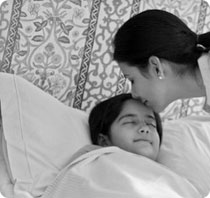

Thalassaemia Major is an autosomal, recessive, single gene blood disorder, which affects more than 100,000 children in India. Detection of Thalassaemia Major normally occurs when the children are between 3 and 6 months of age. The disorder is characterized by the inability to produce appropriate haemoglobin. As a result, delivery of oxygen cannot be effected to the different tissues and cells of the body. The children are dependent on lifelong blood transfusions.
Repeated blood transfusions result in an undesirable build up of iron, which can prove fatal. The children are required to take either injections or medicines daily to dispose off the excess iron (iron chelation). They are also required to be monitored periodically for other complications.
Day Care Centers play a very important role in monitoring the children. Registering the children with Day Care Centers can ensure comprehensive and holistic treatment.
Blood Transfusion, iron chelation, and managing of complications take care of the conventional treatment of children living with Thalassaemia Major. This of course is a lifelong treatment. The only permanent cure available today is a Stem Cell Transplant, for which an HLA matched donor is required.
Blood
Platelets
Blood Drive
Thal Minor
Thal Minor Screening Drive
Platelet Donor
Donate Blood
